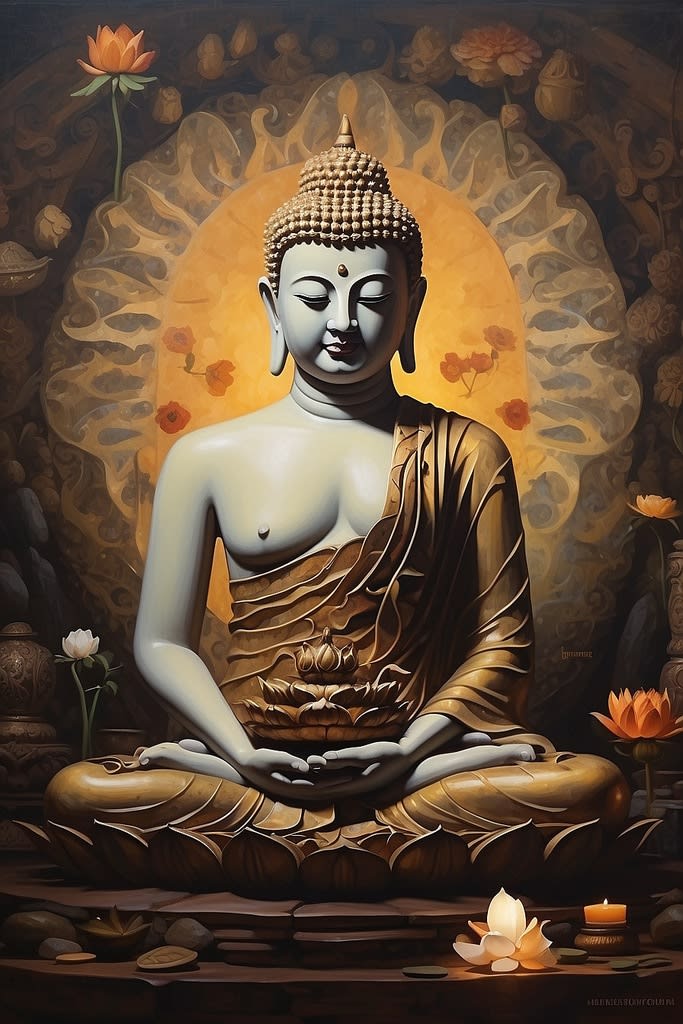身命経 霊魂と身体: 仏教の視点での考察 The Life Sutra: Soul and Body: Consideration from a Buddhist Perspective
1. 「仏の説法: 執着から解放される道」
2. 「断見と常見: 真理への探求」
3. 「霊魂と身体: 仏教の視点での考察」
時は、お釈迦さまが説法を行っていた時代。ある日、沙門ゴータマさんが所用があると言いながら、お釈迦さまに別れを告げました。仏さまは静かに微笑みながら応えました。その後、ヴァッチャ姓の出家者がやって来て、お釈迦さまの教えを聞き、大いに喜んで立ち去りました。
その後、外道の指導者たちが唱える「断見」と「常見」についての辞書の説明があります。断見は世間や自己の断滅を主張し、因果の理法を否定し、死後の運命を否定する誤った考えを指します。常見は常住を主張し、世界や人の不滅を信じる誤った見解です。
そして、霊魂と身体の関係についての質問に対して、お釈迦さまは「無記である」と答えました。なぜなら、彼らが考える霊魂は、かつての聖者たちが説いたアートマンに基づいており、仏教の理解とは異なるからです。アートマンは生命の本体として解釈され、常に不変であるとされてきましたが、仏教ではこの概念を否定しています。
このように、仏教の教えは常に執着を離れ、真理を求める姿勢を示しています。
「人間は願い求めるものごとに執着するという依りどころがあります。自分を取り巻くものごと に染まって心が囚われて)執着するという依りどころがあります。 ただ世尊(先生・尊い師)に おいてはそのような依りどころはなく、正しい悟りを得ておられます。
それでは) 沙門ゴータマさん、なにかと所用もありますので、これにて失礼したいと存じます」 と申し上げました。 仏さまは、
と答えられました。ヴァッチャ姓の出家は以上の仏の説法を聞き、大いに喜んで立ち去りまし
先にご説明した、お釈迦さまご在世当時の外道(仏教以外の宗教者)の指導者たちが唱えていた 「断見」と「常見」が、辞書にはどう説明されているのかをご紹介します。 引用は「佛教語大辞 典』によります。
【断見】だんけん 1世間および自己の断滅を主張して、因果の理法を認めず また人は 度死ねば断して再度生まれることがないとする誤った考え。断無にとらわれる考え。 断 論生はこの世限りのものとし、死後の運命を否定して善悪とその果報を無視する見解。 常 見の対
【常見】じょうけん 常住を主張する見解。断見の対。 世界は常住不滅であるとともに、 人は死んでも我(アートマン)が永久不滅であると執着する誤った見解。
「意生身」というのは、「心だけの身体」あるいは「死後、次の生命を受けるまでの中身 のこと」で、分かりやすくいえば霊体になります。
「余」とは、本来は残りという意味で、業が残っていることを意味しますが、このお経では
「依りどころ」という意味にも使われております。
「愛」 (tapha、タンハー)とは、砂漠で喉の渇きに苦しむ者がひたすら水を求めてやまな いような激しい欲望をいいますが、漢訳ではたんに「愛」としてしまったので、お釈迦さま 表現しようとしたイメージがまったく変えられてしまいました。 この愛がもとになって 執着が生じ、執着によって、輪廻転生 (迷いの生存)が生じるのです。
「世尊」 とは、 Bhagavat (バガヴァット)の漢訳であり、福徳を具えた者の意です。ヴェー ダ聖典においても、叙事詩においても、弟子が師に対して「先生」と呼びかける時の言葉で すが、仏教ではこれを採用して仏陀の尊称のひとつにしました。
さて、先に、ヴァッチャ姓の出家の「霊魂と身体は同じものか」「霊魂と身体は別々のも
のなのか」という質問に対して、お釈迦さまは、いずれの質問にも「無記である」と答えら れました。「無記」は「無記答」ともいいます。 記すべき答え無し。つまり、その質問には 答えるべき内容がない、あるいは適切な答え方が存在しない、ということでしょう。
それはなぜでしょうか?
ヴァッチャ姓の出家が考えている霊魂(命)とは、仏教の起きる二、三百年前に、ウパニ シャッドとバラモンの聖者たちが考えた「アートマン (ātman)」を下敷きにしたものだから です。このアートマンは、元来は、「気息」を意味しましたが、転じて、生命の本体として 「生気」「生命原理」「霊魂」「自己」「自我」の意味に用いられ、さらに、「万物に内在する霊 「妙な力」を意味するに至ったといいます。 要するに、個々の本体を表す術語と考えたらよい でしょう。 バラモンの聖者たちは、このアートマンを常恒不変の存在であると説いたのです。 そして、絶対者ブラフマンとアートマンの本質を悟り、梵我一如の真理を直観して、このプ ラフマンと合一する時、業は消滅し、アートマンは完全に自由になって、業に束縛されてい 輪廻から解脱するというのです。
1. “Buddha’s sermon: The path to freedom from attachment”
2. “Disclaimer and Common View: Quest for Truth”
3. “Soul and Body: Consideration from a Buddhist Perspective”
This was the time when Buddha was preaching. One day, Samon Gautama said goodbye to Buddha, saying he had something to do. The Buddha responded with a quiet smile. Later, a monk with the surname Vaccha came, listened to the Buddha's teachings, and left with great joy.
Afterwards, there is a dictionary explanation of ``danken'' and ``joken'' advocated by the leaders of the outside world. Danken refers to a false idea that insists on the extinction of the world and self, denies the law of cause and effect, and denies a destiny after death. Common view is a false view that claims permanent residence and believes in the immortality of the world and people.
When asked about the relationship between the soul and the body, the Buddha answered, ``There is no record.'' This is because their idea of the soul is based on the atman taught by the sages of the past, which is different from the Buddhist understanding. Atman has been interpreted as the essence of life and has always been considered unchanging, but Buddhism rejects this concept.
In this way, Buddhist teachings always demonstrate an attitude of detachment from attachment and the pursuit of truth.
“Human beings have a tendency to become attached to what they desire.There is a tendency to become attached to things that surround us, and our hearts are captured by them. He has no such reliance and has attained correct enlightenment.
Well then) Mr. Samon Gautama, I have something to attend to, so I would like to excuse you.'' The Buddha is
was answered. A monk with the surname Vaccha heard the Buddha's sermon and left with great joy.
I would like to introduce how the dictionary explains the words ``danken'' and ``joken,'' which were advocated by leaders of outside Buddhism (religions other than Buddhism) during the time of Buddha's lifetime, which I explained earlier. Masu. The quotation is from the ``Great Dictionary of Buddhist Language.''
[Conclusion] Danken 1. He advocated the annihilation of the world and the self, and did not accept the law of cause and effect. He also erroneously held that once a person dies, they will never be reborn. Thoughts that are held up without permission. Dan: A view that regards life as something that lasts only for this life, denies a destiny after death, and ignores good and evil and their fruits. common pair
[Standard] Jouken A view that advocates permanent residence. A pair of denials. The erroneous view is that the world is eternal and immortal, and that the Atman is eternal even after death.
``Will, life, and body'' refers to ``a body consisting only of the mind,'' or ``the contents of the body after death until it receives the next life,'' and to put it simply, it is a spiritual body.
``Yu'' originally means the rest, meaning that karma remains, but in this sutra,
It is also used to mean "dependence".
"Love" (tapha, tangha) refers to the intense desire of a thirsty person in the desert who desperately seeks water, but in Chinese translation it is simply "love". Therefore, the image I was trying to portray of Buddha was completely changed. This love causes attachment, and attachment causes reincarnation (survival of delusion).
``Blessed One'' is the Chinese translation of ``Bhagavat'' and means one who is endowed with good fortune. In both the Vedic scriptures and the epics, the term ``he'' is used when a disciple addresses his master as ``teacher,'' but Buddhism adopted this term and made it one of the honorific titles of the Buddha.
First, let's talk about the questions asked by a monk with the surname Vaccha, ``Are the soul and the body the same?'' and ``The soul and the body are different.''
In response to the question, ``Is this true?'', the Buddha answered, ``No record'' to each question. “No record” is also called “no response.” No answer worth mentioning. In other words, the question may not have any content to answer, or there may not be an appropriate way to answer it.
Why?
The soul (life) that monks with the surname Vaccha are thinking of is based on the ``atman'' that was conceived by the Upanishads and Brahmin sages two or three hundred years before the rise of Buddhism. Atman originally meant ``breath,'' but it was later used to mean ``vital energy,'' ``life principle,'' ``soul,'' ``self,'' and ``ego'' as the substance of life, and was also used to mean ``all things.'' It is said that it came to mean ``mysterious power''. In short, you can think of it as a term that refers to each individual body. The Brahmin sages taught that this Atman is eternal and unchanging. When one realizes the essence of the Absolute Brahman and Atman, intuiting the truth of the Brahma Oneness, and unites with this Purity Rahman, karma disappears and the Atman becomes completely free and free from karma. It is about getting liberated from the bondage of samsara.



















